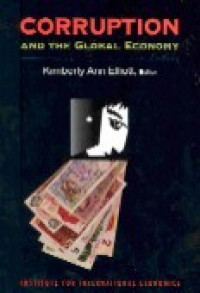
Corruption and the global economy
| Gmd : Text
| Availability :
| 00000010029 | JF1081 .C673 1997 | (General Book) | Available - Ada |
Corruption afflicts both developing and developed countries, evidenced by recent scandals in Mexico, Ecuador, Korea, Japan, Italy, Russia, the United States, and elsewhere, Bribery often undermines political legitimacy, squanders government revenues, and distorts international trade and investment flows. Where is pervasive, corruption can deter investment, thereby lowering growth.
In a number of countries, pervasive corruption is a serious obstacle to economic development. Yet, in spite of significant corruption, several East Asian countries have enjoyed rapid and sustained rates of economic growth, with benefits spread widely across the population. Why has corruption undermined growth in some situations lead to more corruption or to more corrosive forms of corruption? Do certain economic policies - such as extensive government regulation and discretionary industrial policies or, on the other hand, open trade and investment regimes - tend to foster or inhibit corruption?
This book examines the causes and consequences of corruption, with particular attention to its impact on economic and political development. It also explores the steps that nongovernment organizations, developing-country governments, multilateral development banks, multinational firms, and the home countries of these firms can take to combat corruption. It recommends that the members of the OECD continue to push for the criminalization of transnational bribery; that the World Bank and other multilateral and bilateral development agencies vigilantly guard against malfeasance and devote more resources to improving governance and reducing corruption; and that the members of the World Trade Organization negotiate an agreement to enhance transparancy and provide and due process in government procurement.
About the author :
Kimberly Ann Elliott is a Reseach Fellow at the Institute for International Economics. She is the author of numerous articles on economic sanctions and US trade policy, and co-author of Reciprocity and Retaliation in US Trade Policy (1994). Measuring the costs of protection in the United States (1994), Economic Sanctions Reconsidered (2nd. ed., 1990) and Auction Quotas and United States Trade Policy (1987).
| Series Title |
-
|
|---|---|
| Call Number |
JF1081 .C673 1997
|
| Publisher Place | Washington DC |
| Collation |
xiv, 244 p. : ill. ; 23 cm.
|
| Language |
English
|
| ISBN/ISSN |
0881322334
|
| Classification |
J
|
| Media Type |
-
|
|---|---|
| Carrier Type |
-
|
| Edition |
-
|
| Subject(s) | |
| Specific Info |
-
|
| Statement |
-
|
| Content Type |
-
|
No other version available







